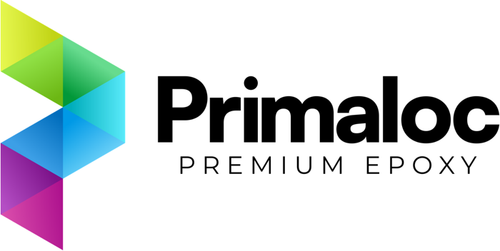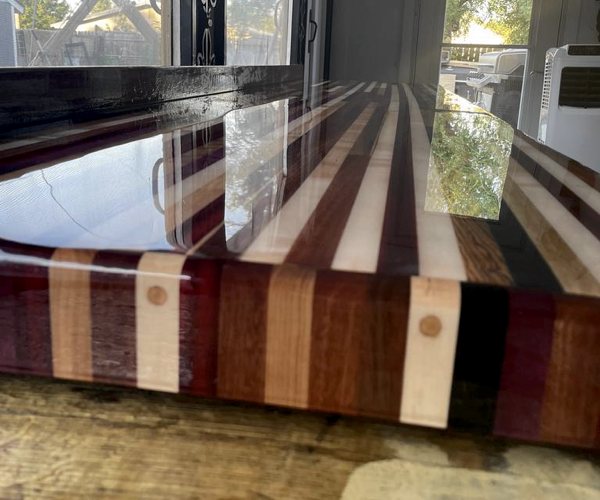Giving your countertops an epoxy resin coating is an exciting prospect. With so many ways to customize it, an epoxy finish gives you a lot of freedom to tailor its appearance to your own personal aesthetic preferences.
Perhaps your goal is to produce something elegant, either by leaving the epoxy resin in its naturally clear state or by coloring it with soft or neutral pigment hues—or maybe you're more inclined to spring for vibrant and spectacular tones, you'll undoubtedly end up with something unique to put on display to your friends, family, or customers.
When it comes to planning an epoxy project, however, some users might feel a bit overwhelmed at first. The good news is that we've written a variety of guides and articles designed to help you navigate the decision-making process for your epoxy countertop project.
You can see some of these on the following pages:
- Primaloc Answers: How Much Does an Epoxy Bar Top Cost? - Learn how to determine the core costs for your project.
- Primaloc Epoxy Basics: Achieve Stronger Bonds Through Proper Cleaning - Properly preparing your countertop substrate is key to achieving an ideal finish.
- Primaloc Tips: Measuring the Amount of Epoxy You Need - Getting just the right volume of epoxy will ensure a strong, long-lasting seal.
- Primaloc Answers: How Thick Should a Bar Top Epoxy Finish Be? - Discover the answer to this question so you can plan your countertop project.
- Primaloc Epoxy Basics: Epoxy Project Tools and Supplies - Make sure you have the right tools and supplies for the job.
Each of those articles provides useful information for planning your epoxy countertop project. In this piece, though, we'll address a frequently asked question: "Do epoxy countertops need a topcoat?"
Do Epoxy Countertops Need a Topcoat?
Epoxy countertops typically don't need an additional topcoat. The epoxy resin itself, when cured, forms a durable, glossy, and protective layer that serves both as the countertop surface and its protective coating. This layer is resistant to moisture, stains, and many forms of wear and tear, making an additional topcoat unnecessary in most situations.
However, some specific applications or design preferences might call for an extra topcoat or finish for added protection or aesthetic reasons (such as a topcoating of paint to achieve a particular visual effect), but this is not common for standard epoxy countertop installations.
Most Other Topcoats Are Meant for Weaknesses Epoxy Doesn't Have
Epoxy's hefty resilience means it generally doesn't benefit significantly from an additional protective layer, as its few vulnerabilities are not easily mitigated by applying another material on top.
For example, a well-known limitation of clear epoxy is its potential to yellow if subjected to prolonged direct sunlight. While applying a paint layer could theoretically shield the epoxy from UV rays, the paint itself would then bear the brunt of UV exposure and would necessitate its own maintenance routine.
A more effective strategy to counteract UV-related yellowing is to limit the epoxy's exposure to direct sunlight or use UV-resistant epoxy formulas. Additionally, incorporating mica powder pigments into the epoxy before application can help minimize the visibility of yellowing while offering an aesthetic appeal without the need for a topcoat.
An Epoxy Coating Is an Exceptional Surface-Level Sealant
Epoxy resin isn't just physically durable—though its resistance to scratching as well as cracking and denting from heavy impacts is a valuable trait—it's also waterproof.
Waterproof and Chemically Resistant
Epoxy's waterproof nature prevents water and other liquids from permeating its surface. The coating's smooth, consistent molecular bond prevents liquid stains while also preserving any substrate materials from being affected as well.
Additionally, epoxy also has noteworthy chemical resistance, able to withstand a variety of solvents and corrosive compounds that might be present in countertop environments. For the ones strong enough to affect epoxy, its resilience means it can endure the dissolving effects of these chemicals for longer than most other sealants, giving you time to address the issue without damage to the substrate.
Food Safe and Long-Lasting
On top of all this, cured epoxy resin is also food safe, making it an excellent option as a countertop surface even in kitchens and restaurants. Though preparing food directly on an epoxy surface is not recommended—as sharp knives can cut into the finish—direct contact with food is not toxic, and provided the surface is sanitary, food can even be eaten right off the cured epoxy surface.
Furthermore, an epoxy finish can last for many years, so its rare that you'll have to perform significant maintenance on your epoxy countertop. Instead, just some basic cleaning will usually keep it in great condition.
A Medium Level of Heat Resistance That Gets the Job Done
Alongside its chemical and physical resistance, and its waterproof nature, epoxy resin also has a medium level of heat resistance. For temperatures up to 135°F, epoxy resin will have no issues. To give a point of reference, this is hot enough to cause significant burns to human skin.
For temperatures higher than that, an epoxy finish may begin to soften or morph. As such, it's recommended that users take advantage of helpful heat buffers such as trivets and coasters for extremely hot objects (e.g., heated cookware).
Epoxy Countertops Simply Don't Need Topcoats of Other Sealants
The only type of topcoating an epoxy finish might need is just another flood coat of epoxy. If your resin finish ever becomes damaged, it can be renewed in most cases with a simple recoating.
Generally, renewing an epoxy finish involves giving it a light sanding and cleaning, followed by a flood coating of the same epoxy brand and variant. If handled correctly, the new coating will seamlessly mesh with the old one, making it all seem like one pristine layer.
Learn how to apply additional layers to your epoxy finish in our guide here.
Primaloc Epoxy: Premium Epoxy for Premium Results
When it comes to epoxy resin, Primaloc Epoxy gets the job done. Our epoxy resin is premium-grade, with high performance in every category, including:
- Unmatched Strength: A Primaloc finish won't buckle, even under high pressure.
- Long-Lasting Resilience: Primaloc epoxy lasts for many years with minimal care, and can endure high-traffic environments with ease.
- A Crystal-Clear Coating: With its pristine, transparent appearance, looking at a cured Primaloc coating is like peering through a window.
Epoxy resin can be beautiful, strong, and long-lasting—which is why you shouldn't compromise on quality. With Primaloc Epoxy Resin, you get the ultimate finish in durability and visual appeal.
Protect your surfaces by giving them a rock-solid epoxy finish. Choose strong. Choose reliable. Choose Primaloc.





